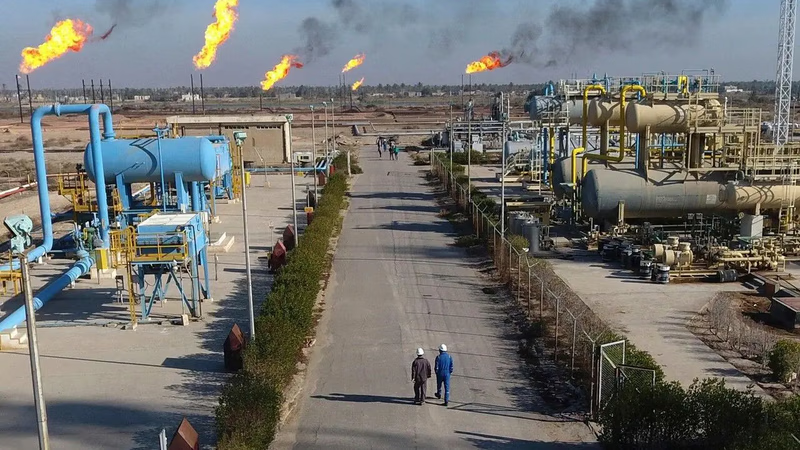
Iraq"s oil sector remains crucial for trade and economic stability. "
Iraq possesses significant oil reserves, making it one of the world's largest oil producers and exporters. Oil exports contribute a substantial portion of the country's revenue and foreign exchange earnings. However, Iraq's economy remains heavily dependent on oil exports, which exposes it to fluctuations in global oil prices. Iraq has faced numerous economic challenges, including the aftermath of decades of wars, economic sanctions, political instability, corruption, and inadequate infrastructure. These factors have hindered the country's economic diversification, private sector development, and overall economic growth.
The Iraqi economy is heavily dependent on oil, in other words, it is based on the oil economy. About 95% of Iraq's total oil revenues come from the sale of Iraqi oil. Numerous wars in Iraq and long-term international sanctions have left the Iraqi economy behind. The Iraqi oil sector is facing technical challenges in the production, transportation, and storage of crude oil and petroleum products, according to Special Observers for Iraq Reconstruction. It also faces problems such as managing prices and imports, combating smuggling and corruption, improving budget allocation and implementation, and maintaining oil operations. Oil production in Iraq has not yet reached pre-US levels.
Iraq has recognized the need for economic diversification to reduce its dependence on oil and promote sustainable growth. Efforts have been made to develop sectors such as agriculture, industry, tourism, and non-oil exports. However, progress in diversification has been limited, and the oil sector continues to dominate the economy. Iraq faces significant unemployment and underemployment, particularly among the youth population. Job creation and improving living standards remain critical challenges. The government's ability to address social and economic inequalities, provide essential services, and create employment opportunities is crucial for long-term stability and development.
The economic structure of Iraq, like all the countries of the Persian Gulf, is based on the production and sale of oil. Iraq is the third-largest oil producer in the world, and the cost of producing oil in that country is the lowest cost of producing oil in the world. During the year, revenues from crude oil exports accounted for the percentage of GDP and the percentage of government revenues. This year, Iraq became the 15th largest oil producer in the world due to the war and the blows caused by the occupation, as well as the consequences of international sanctions and the wars of the Ba'athist regime.
Iraq engages in international trade, primarily exporting oil and petroleum products. The country imports a wide range of goods, including machinery, consumer goods, and food products. Iraq's trade balance is heavily skewed towards imports, resulting in a trade deficit. Iraq has received international assistance and support from multilateral organizations, such as the International Monetary Fund (IMF) and the World Bank, to address economic challenges, implement reforms, and promote sustainable growth. These efforts have included initiatives to strengthen governance, improve public financial management, and enhance the business environment.
The Iraqi economy has been severely weakened by more than a decade of economic sanctions and war and needs investment and modernization. According to reports, the long-term and major reconstruction of Iraq will cost more than a few billion dollars, of which at least a third will be allocated to the oil, gas, and electricity sectors.
In the current situation, the Iraqi people are in a very bad economic situation, and the Iraqi government is not able to meet their basic needs and create jobs for them, and now the unemployment rate in Iraq is official / percent. At the same time, the Iraqi Minister of Commerce has announced that the national unemployment rate and the low unemployment rate in this country are between up to one percent, and the Iraqi Minister of Labor and Social Affairs announces this figure as more than one percent. The conditions of war and sectarian strife have displaced more than four million Iraqis, making the economic situation more critical.
Iraq has undertaken extensive reconstruction efforts to rebuild its infrastructure, particularly after the defeat of ISIS. The government has sought foreign investment in sectors such as energy, construction, telecommunications, and transportation to support economic development and job creation. However, challenges such as bureaucratic hurdles, security concerns, and corruption have impacted the pace of investment and reconstruction. Iraq's fiscal situation has been strained due to its heavy reliance on oil revenues, which are vulnerable to price volatility. Government spending, particularly on public sector salaries, pensions, and subsidies, has strained the budget. Fiscal deficits and a high public debt-to-GDP ratio have necessitated efforts to diversify revenue sources and reduce expenditures.
-

Iraq"s trade landscape is shaped by its membership in the WTO and participation in regional agreements like GAFTA. The country maintains strong bilateral trade relations with neighbors such as Iran, Turkey, and Jordan, facilitating the exchange of goods and investment. China stands out as a major trading partner, supplying machinery and consumer goods while being the largest importer of Iraqi oil. India also plays a significant role, providing pharmaceuticals and textiles alongside substantial oil imports. The United States exports machinery and vehicles to Iraq, while South Korea invests in infrastructure projects. Despite extensive trade ties with Iran, data on this relationship is limited due to informal trading practices and sanctions. Iraq"s primary export remains oil, with China and India being key buyers. In 2018, Iraq"s exports were predominantly directed towards China (26.
25%) and India (36. 24%). On the import side, Iraq sources goods from various countries including China (28. 64%) and Turkey (24. 27%). The country also exports agricultural products like dates and grains, alongside chemicals and manufactured goods. Understanding these dynamics is crucial for businesses looking to engage in Iraq"s evolving trade environment.
-
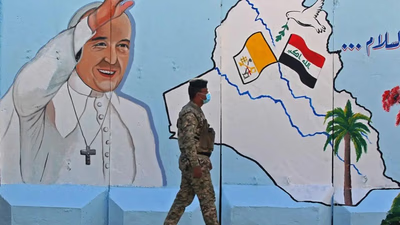
Understanding the export landscape in Iraq requires thorough market research to identify demand, competitors, and trends. Exporters must navigate cultural, economic, and regulatory factors that influence their strategies. Key documentation includes commercial invoices, packing lists, and customs declarations, all of which must comply with Iraqi regulations. The strong trade relationship between Iran and Iraq highlights the potential for profit in this market. Customs procedures vary by product category, necessitating consultation with customs brokers for compliance. Additionally, exporters should be aware of specific product standards and certifications required in Iraq. A reliable logistics provider is essential for smooth transportation and customs clearance. Payment methods such as letters of credit or bank transfers are common, and exploring export financing options can mitigate risks.
Understanding Iraqi cultural norms is crucial for effective communication and relationship-building with local partners. The political structure is complex, with significant power held by provincial councils alongside the central government in Baghdad. The economy is heavily reliant on oil exports, supported by international financial assistance. Staying informed about legal regulations and security conditions is vital for successful operations in Iraq. Establishing local partnerships can enhance market insights and facilitate business connections.
-

Iraq"s economy is heavily reliant on oil, contributing approximately 95% of its total revenues. Despite being one of the largest oil producers globally, the country faces significant economic challenges due to political instability, corruption, and inadequate infrastructure. The reliance on oil exposes Iraq to global price fluctuations, hindering economic diversification and growth. Efforts to develop sectors like agriculture and tourism have seen limited success, with unemployment rates remaining high, particularly among youth. The government struggles to provide essential services and create jobs, exacerbating social inequalities. International assistance from organizations like the IMF and World Bank aims to address these issues through governance reforms and improved public financial management. However, bureaucratic hurdles and security concerns continue to impede foreign investment in critical sectors such as energy and construction. Iraq"s fiscal situation is strained by its dependence on oil revenues, leading to budget deficits and a high public debt-to-GDP ratio. Reconstruction efforts post-ISIS have been initiated but face challenges that slow progress towards sustainable economic development.
-

Customs clearance in Iraq begins with submitting a customs declaration form via the Automated System for Customs Data (ASYCUDA). Importers must provide detailed information about the goods, including description, quantity, value, and country of origin. Certain items may require import licenses or permits from Iraqi authorities, which must be obtained prior to importation. Essential documents for clearance include a commercial invoice, packing list, bill of lading or airway bill, certificate of origin, and any necessary licenses. Fees associated with customs processing can vary based on the goods" nature and value. Once all duties and fees are settled, goods are released for transport within Iraq. However, navigating customs can be complex due to varying laws across provinces and potential security issues. Exporters must also be aware of cultural contexts and trade regulations that differ between regions.
Documentation requirements may change over time; thus, staying informed is crucial. Consulting local experts or institutions can facilitate smoother transactions but may involve bureaucratic challenges and costs. The customs authorities assess the value of imported goods based on transaction values and applicable tariffs using the Harmonized System (HS) for classification. Inspections by customs may occur to ensure compliance with regulations. "
-
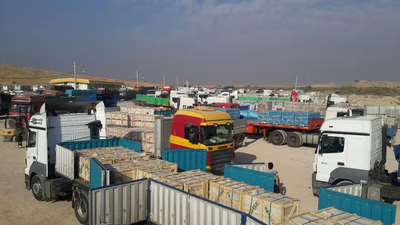
Iraq"s transportation infrastructure is primarily road-based, with trucks being the main mode for goods movement across its extensive network. While rail transport exists, it mainly serves passengers, with limited freight capabilities. International Transport Group specializes in facilitating cargo transport to Iraq, offering services from loading at the origin to delivery at the destination. The most efficient method involves direct loading in the country of origin and shipping via standard trucks. Additionally, goods can be transported through Iranian border customs terminals before entering Iraq. River transport remains relevant, especially for bulk and agricultural products in southern regions. Pipelines are crucial for oil and gas transport, significantly impacting Iraq"s economy. Sea transport through ports like Umm al-Qasr is vital for international trade, while airfreight from various international airports enhances the speed of shipping high-value items. Despite challenges such as sanctions and historical conflicts affecting industrial growth, opportunities exist for Iranian traders in sectors like health tourism and technical services.
-

Iraq"s geography significantly influences its cultural and linguistic diversity. The Tigris and Euphrates rivers provide fertile land, shaping agriculture and settlement patterns. This region, historically a crossroads of civilizations, fosters cultural exchange. Iraq"s population of approximately 40 million speaks Arabic and Kurdish as official languages, with various ethnic groups preserving their unique dialects. The country is rich in history, often referred to as the "cradle of civilization," home to ancient civilizations like the Sumerians and Babylonians. Iraq"s diverse landscapes include lowlands, deserts, and mountainous areas, contributing to its rich cultural heritage. The literacy rate ranges from 60% to 70%, with a significant Muslim population practicing various religious traditions. Iraq"s historical ties with neighboring regions have influenced its culture and trade dynamics.
-
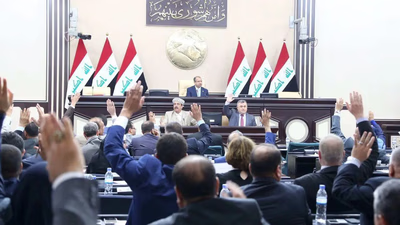
Iraq"s investment laws aim to attract both domestic and foreign investments, fostering economic growth and a conducive business environment. Key legislation includes Investment Law No. 13 of 2006 and its amendments, which offer incentives such as tax exemptions, customs duty waivers on machinery, and land allocation for projects. The laws encourage technology transfer, job creation, and the protection of investor rights while expanding Iraq"s export capabilities. Dispute resolution mechanisms are in place through local courts or international arbitration. Specific sectors like oil and gas have tailored regulations overseen by relevant ministries. Foreign investors benefit from various incentives including insurance provisions, stock exchange participation, long-term land leases, and tax exemptions for up to ten years. The National Investment Commission (NIC) plays a crucial role in promoting investment by providing necessary information and facilitating processes.
However, certain restrictions apply to investments in oil extraction, banking, insurance companies, and land acquisition for non-Iraqis. The Investment Law encompasses diverse sectors such as industry, agriculture, tourism, housing, infrastructure, and services while allowing various investment forms like joint ventures or acquisitions.
-
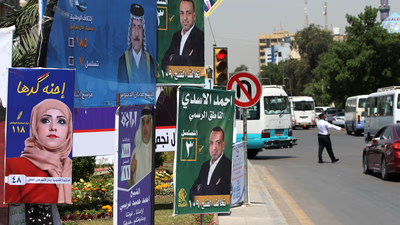
Exporting products to Iraq requires compliance with specific regulations, including labeling in Latin and Arabic. The Iraqi Standardization Institute mandates these labels for goods, particularly from Iran. Failure to meet these requirements can lead to customs rejection, causing significant losses for exporters. Trade routes between Iran and Iraq include both formal and informal customs points, with key locations such as Bashmaq and Parviz Khan Customs facilitating the majority of exports. Understanding the cultural and political landscape is crucial for successful trade, as Iraq"s diverse ethnicities and historical challenges impact business operations. Despite its potential as a lucrative market, exporters must navigate instability and ongoing political issues. The reconstruction efforts in Iraq present opportunities for foreign traders, particularly in sectors like construction and energy, where Turkey has established a strong presence. However, the complex socio-political environment necessitates careful planning and local knowledge to ensure successful market entry. "
-
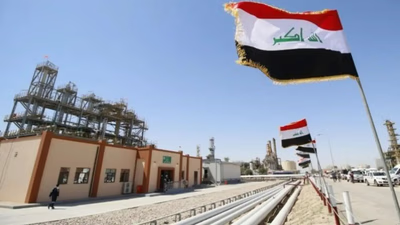
Iraq"s economy is heavily dependent on oil exports, which influences the demand for non-oil goods. Exporters must conduct thorough market research to assess product demand, competition, and potential sales volume in Iraq. Understanding consumer preferences and purchasing power is essential for determining profitability. Compliance with trade regulations, customs duties, and taxes is crucial for successful exporting. Currency exchange rates can affect pricing strategies, so establishing clear payment terms and mitigating risks like delayed payments is important. Political stability and security conditions also impact the business environment in Iraq. Adapting products to local preferences can enhance appeal and profitability. Since 2003, Iraq has been a significant trading partner, with Iran being a major exporter of non-oil goods such as food items, industrial parts, and health services.
For small to medium-sized companies, indirect exporting through intermediaries is often recommended. Competitive pricing based on local market analysis is vital for success in Iraq"s diverse market landscape.









